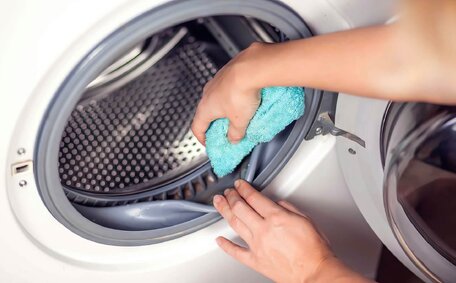Understanding How Chemical Drain Cleaners Work
Acidic drain cleaners dismantle clogs through chemical reactions that produce heat and gas, clearing drains effectively.
- Acidic cleaners that use sulfuric acid or hydrochloric acid
- Alkaline cleaners with sodium hydroxide or potassium hydroxide
- Oxidising drain cleaners containing compounds such as sodium hypochlorite or potassium permanganate
Chemical drain cleaners are designed to tackle all types of clogs, from hair and soap scum to grease and tree roots. They often display remarkable effectiveness at clearing tough blockages, including those caused tree roots. However, It’s crucial to weigh the benefits against risks like pipe corrosion and environmental harm when considering chemical drain cleaners.
Types of Chemical Drain Cleaners
- Acidic cleaners - Contain sulfuric acid which can or hydrochloric acid that dissolves hair, soap scum, and organic materials
- Alkaline cleaners - Use sodium hydroxide or potassium hydroxide to saponify fats and oils
- Oxidising cleaners - These cleaners include sodium hypochlorite or potassium permanganate that effectively oxidises debris
Formulated for safety, each type of cleaner is designed to penetrate and dislodge diverse clogs. Nevertheless, there’s no question that without careful handling, using drain cleaner can risk damaging pipes and contaminating waterways, therefore, users must exercise caution.
Oxidizing Drain Cleaners
Liquid drain cleaners include substances like sodium hypochlorite or potassium permanganate to efficiently clear clogs. Products such as Liquid Fire and Whink’s liquid drain solutions rely on oxidizers to dissolve grease, oil, and stubborn blockages.
These products initiate an oxidation reaction with hair, grease, or food waste, decomposing the material. Oxidation causes the electrons from the clog to transfer to the oxidising agents in the cleaner, thus dissolving the obstruction.
Oxidising cleaners effectively render blockages, including those from tree roots, soluble.
Nevertheless, the drawbacks of oxidising chemical drain cleaners must be considered. It’s critical to follow all package directions and washing instructions when using drain cleaning products.
The oxidation reaction generates heat, which can warp or melt various types of pipes, but is effective against persistent clogs if the cleaner sits too long. The chemicals used can give off toxic fumes and cause burns if spilled on skin.
Caustic Drain Cleaners
Alkaline drain cleaners contain highly alkaline ingredients like lye or caustic potash (potassium hydroxide). When these caustics come into contact with fats, oil, and grease from your sink, they initiate a chemical reaction called saponification.
This process converts the grease, which is thicker than water, into a soapy solution, dissolving and moving more fluidly down your drain channels.
Caustic cleaners are highly effective against stubborn grease clogs, yet they also present risks to household drains. yet improper use can harm metal pipes and porcelain, potentially causing blockages.
Brands like Liquid-Plumr and Drano utilise caustic agents in their gel formulations to penetrate thick, oily obstructions.
Particularly, these cleaners must be avoided around plumbing elements made of aluminium to prevent hazardous reactions. The caustic chemicals can react vigorously with aluminium, corroding it away. The reaction generates extreme heat and releases flammable hydrogen gas, creating plumbing repair hazards.
While caustic cleaners can occasionally clear stubborn grease, frequent use increases the risk of pipe damage and corrosion. For regular drain maintenance, safer options exist such as boiling water treatments, plungers, plumber’s snakes, and enzyme cleaners that avoid harsh chemical usage.
Acidic Drain Cleaners
Acidic drain cleaners contain strong acids such as sulfuric or hydrochloric acid, effective at dissolving hair, soap scum, and organic debris causing clogs. Brands like Thrift and Zep use these corrosive acids to dissolve hair, soap scum, and other clog components.
Acidic cleaners react intensely with blockages like hair, grease, food scraps, and mineral deposits when poured down a drain. The dense acids work to break down organic matter within the clog, enabling the clearing of the drain pipe. Their highly caustic nature to skin and potential to damage PVC drains underscores the necessity for careful handling.
If spilled on skin, acidic drain cleaner can cause serious chemical burns. Acidic formulas should never be mixed with other drain cleaners, as violent reactions can occur. They can be especially damaging to metal pipes and porcelain fixtures over time.
The fumes released from products can also cause irritation through standing in enclosed areas.
Though effective for tough clogs, regular use of safer drain maintenance methods is advised. Options like enzyme cleaners, boiling water, plungers, or snaking tools avoid caustic chemical hazards while still effectively clearing drains.
Evaluating the Pros: Effectiveness and Convenience
The best drain cleaner offers key benefits in terms of effectiveness and convenience when used properly:
- Fast-acting on common clogs - Chemical reactions can quickly penetrate and dissolve blockages caused by hair, grease, soap scum and food waste.
- Easily available - Drain cleaner products are readily available at supermarkets and hardware stores for convenient purchase.
- Cost-effective for some clogs - Opting for the best drain solutions can sometimes be more cost-effective than enlisting a plumber to mechanically clear simple clogs.
- Easy to use - Using these cleaners typically involves pouring them down the drain and waiting for them to act.
When safety measures are observed, heavy duty cleaners with prudent use chemical drain solutions can double as a home remedy for effectively freeing sinks or tubs from clogs caused by hair and grease. However, they pose risks when used improperly, especially for sewer drains, so following instructions carefully is critical.
Considering the Cons: Health and Environmental Concerns
While chemical drain cleaners can be convenient and effective when used properly, they also carry notable downsides in terms of health hazards and environmental impacts:
- Toxic fumes - Acids and caustics can emit hazardous fumes, causing irritation to eyes and respiratory systems.
- Skin burns - Spilled cleaner can cause chemical burns, blisters and serious injuries.
- Pipe damage - Corrosive ingredients may end up wearing away pipes, fittings and fixtures over time.
- Reactivity - Acidic cleaners should never mix with alkaline cleaners as violent reactions occur.
- Environmental harm - Residues from chemical cleaners can pollute waterways and damage ecosystems.
- Limited biodegradability - Caustics and acids break down slowly, persisting in the environment.
Repeated application of chemical cleaners can lead to accumulation and potential adverse reactions with pipe materials, thus requiring prudent use. Safer regular drain care options like boiling water, plungers or enzyme cleaners avoid these health and ecological impacts.
Exploring Eco-Friendly Alternatives
There are several alternative drain cleaning methods that are gentler on pipes and the environment than harsh chemical cleaners:
- Boiling water - Pouring a pot boiling water into drain passages can much more effectively help dissolve grease obstructions and dislodge hair.
- Baking soda and vinegar - Mixing baking soda and vinegar creates a chemical reaction that breaks up debris. Allowing the mixture to sit also cleans pipe walls.
- Plungers - Using a sink plunger or drain snake along with boiling water can manually push through clogs.
- Enzyme drain cleaners - These solutions utilise bacteria to consume anaerobic and organic buildup in drains effectively, safeguarding the pipes from damage.
Natural methods may take more effort compared to chemical options, but they sidestep associated health and environmental hazards. In cases of severe blockages, enlisting a professional plumber for mechanical drain cleaning is the safest method.
Homeowners can find a balance between efficacy and safety by adopting eco-friendly cleaning methods.
Boiling water -soda and vinegar - Mixing baking soda and vinegar creates a chemical reaction that breaks up debris.Plungers - Using a sink plunger or drain snake along with boiling water can manually push through clogs.Enzyme cleanersPreventive Measures and Home Remedies
There are several methods to help prevent clogs and keep drains clear without using harsh chemical cleaners:
- Use drain catchers to trap hair and food debris before it enters pipes
- Pour a half cup of baking soda followed by vinegar down drains monthly to break down buildup.
- Flush pipes weekly with hot water to melt grease accumulations
- Use a simple tool like a coat hanger monthly to manually extract hair and soap scum
- Enzyme cleaners can safely breakdown organic build up without causing harm to the pipes
Implementing simple, natural drain care techniques can protect your plumbing system from obstructions forming in the first place. Engaging a professional for annual drain cleaning aids in maintaining free-flowing pipes in your home.
Staying on top of small clogs before they worsen saves the hassle, hazards and environmental impact of chemical drain cleaners over time.
When to Call a Professional Plumber
While chemical drain cleaners can provide a convenient solution for some clogs, certain situations demand professional assistance. Recurring clogs, back-ups affecting multiple fixtures, strong sewage odours or leaks also indicate the need for pro service.
When persistent clogs remain after using chemical products, it’s wise to seek professional plumbing services for mechanical removal and inspection.
Cambridge Park Plumbing’s expert services are advised for a wide range of drain issues, including tree root infiltrations and significant pipe damage due to chemicals. Our licenced, bonded and insured technicians have the latest equipment and methods to clear any drain safely and efficiently. We also offer regular maintenance plans to prevent clogs proactively.
For eco-friendly and reliable drain solutions, reach out to Cambridge Park Plumbing at 1300 349 338 or via [email protected]. Investing in reliable plumbing services can save money, avoid health hazards and cut environmental impact, proving vital for savvy homeowners.





